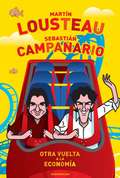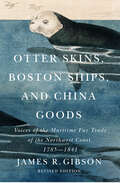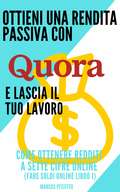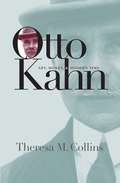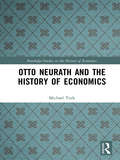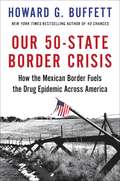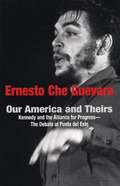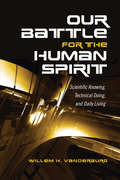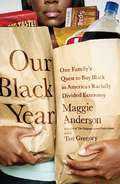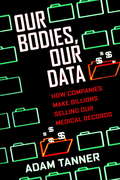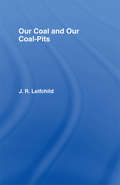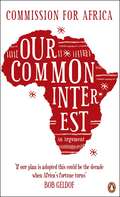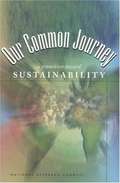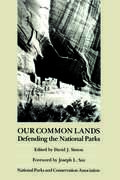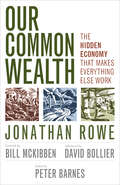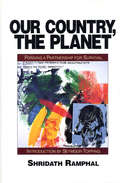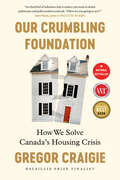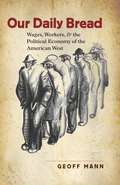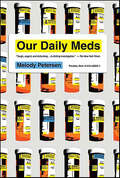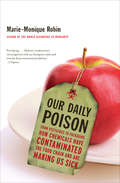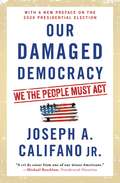- Table View
- List View
Otis Elevator: Accelerating Business Transformation with IT
by Brian J. Delacey F. Warren McFarlanFocuses on a major transformation of Otis Elevator's infrastructure. Led by the CEO, this transformation represents a remarkable long-term reengineering of all the processes of the firm to drive its operating costs down and service image up. The transformation is the continuation of a process that has been going on for more than 20 years.
Otra vuelta a la economía
by Sebastián Campanario Martín Lousteau¿Sabés a qué edad se alcanza el punto máximo de felicidad? ¿Por quénadie predijo la crisis global? ¿Estás yendo a suficientes fiestas? ¿Aceptarías currículums sin foto, ni datos de edad o sexo? ¿Por qué lasletras QWERTY están en la primera línea del teclado? Un recorrido por loúltimo en materia de economía no convencional. ¿Qué invento fue más importante, el lavarropas o Internet?¿La secuencianumérica 4 8 15 16 23 42 te dice algo?¿Cuánto falta para usar dinerovirtual y vivir mil años? ¿Los containers deberían tener mejor prensa? ¿Las telenovelas causan divorcios? ¿Es peor cumplir años en invierno? ¿Dónde nació el bebé número 7000 millones? ¿Sería mejor que las mujeresmanejen las finanzas globales? ¿Necesitás ayuda para organizar tusvacaciones? ¿La solidaridad puede venir en forma de spray? ¿Por quéÁfrica es el futuro? ¿Existe un método para que los varones dejen desalpicar la tabla del inodoro?La economía puede responder estas preguntas porque tiene un carril menostransitado y mucho más atractivo del que imaginás. «Otra vuelta a laeconomía» te lleva por un camino poco común, que influye en nuestra vidadiaria y está replanteando las políticas públicas de varios gobiernos.Martín Lousteau y Sebastián Campanario dan vuelta la economía, laaceleran, la frenan y la ponen patas para arriba.
Ottawa Devices, Inc. (A)
by Henry B. Reiling Harry C. MidgleyA master plan accommodating two retiring brothers, the brother who will remain as president, third-generation family members, employees, philanthropic interests, and company imperatives must be developed by second-generation brothers who are controlling shareholders and senior management team members. This case reviews several estate planning concepts the family implemented and asks the student to formulate an optimal plan for transferring control of the company while reconciling conflicting interests.
Ottawa Voyageurs
by Thomas J. Delong David L. Ager Andrew Feng Chris Strong Eliza Mody Scott BaldwinManuel Tertuliano, head coach of a professional soccer club, must make some difficult decisions about the compensation of six of his players. Specifically, he must decide how to allocate $850,000 among these six players in a way that will benefit his team, which has just finished second to last in the league and faces being eliminated from the league if team performance and game attendance don't improve. Tertuliano realizes that compensation is a key tool in motivating his players. In deciding on these six players' compensation, Tertuliano must ensure that he not only recognizes them, but also the other players on the team for the value each individual contributes to the team.
Otter Skins, Boston Ships, and China Goods: Voices of the Maritime Fur Trade of the Northwest Coast, 1785-1841, Revised Edition (McGill-Queen's Indigenous and Northern Studies)
by James R. GibsonBefore contact with white people, the Indigenous peoples of the Northwest Coast traded amongst themselves and with other Indigenous groups farther inland, but by the end of the 1780s, when Russian coasters had penetrated the Gulf of Alaska and British merchantmen were frequenting Nootka Sound, trade had become the dominant economic activity in the area. The Tlingit, Haida, Tsimshian, Nootka, Salish, and Chinook spent much of their time hunting fur-bearing animals and trading their pelts to settler traders for metals, firearms, textiles, and foodstuffs. The Northwest Coast First Nations used their newly acquired goods in intertribal trade while the Euro-American traders dealt their skins in China for teas, silks, and porcelains that they then sold in Europe and America. While previous studies have concentrated on the boom years of the fur trade before the War of 1812, James Gibson reveals that the maritime fur trade persisted into the 1840s and that it was not solely or even principally the domain of American traders. He gives an account of Russian, British, Spanish, and American participation in the Northwest traffic, describes the market in South China, and outlines the evolution of the coast trade, including the means and problems. He also assesses the physical and cultural effects of this trade on the Northwest Coast and Hawaiian Islands and on the industrialization of the New England states. Uncovering many Russian-language sources, Gibson also consulted the records of the Russian-American, East India, and Hudson’s Bay Companies, the unpublished logs and journals of American ships, and the business correspondence of several New England shipowners. No more comprehensive or painstakingly researched account of the maritime fur trade of the Northwest Coast has ever been written.
Ottieni una rendita passiva con Quora e lascia il tuo lavoro: Come ottenere redditi a sette cifre online (Fare soldi online libro 1)
by Marcus PfeifferVorresti fare soldi online? Vorresti guadagnarti da vivere da casa, eppure per qualche ragione hai difficoltà e non guadagni abbastanza? Credimi, alcuni anni fa mi trovavo nella tua stessa situazione. Ho cercato a ogni angolo del world wide web e ho provato a capire come fare soldi sulla rete, ma non ho fatto un centesimo. Peggio: ho sprecato un mare di denaro in corsi, pubblicità, siti web, libri e investimenti sbagliati. Fortunatamente un giorno mi sono imbattuto in un metodo che mi ha aiutato a ottenere una rendita passiva. Però, non mi fraintendere: passiva non significa che non ci sia da lavorare per avere profitti. Significa solo che una volta fatto il lavoro i soldi arriveranno in un flusso continuo, senza una tua partecipazione attiva o particolarmente attiva. Tuttavia finché non hai raggiunto questo livello, in cui i soldi semplicemente arrivano da soli, devi lavorare duramente, e non poco. In questo libro ti mostrerò l’approccio che io ho usato per fare una fortuna. E ti prometto che, se lavorerai duramente come richiesto, arriverai a un reddito a sette cifre in pochissimo tempo.
Otto Kahn
by Theresa M. CollinsIn the early decades of the twentieth century, almost everyone in modern theater, literature, or film knew of Otto Kahn (1867-1934), and those who read the financial press or followed the news from Wall Street could scarcely have missed his name. A partner at one of America's premier private banks, he played a leading role in reorganizing the U.S. railroad system and supporting the Allied war effort in World War I. The German-Jewish Kahn was also perhaps the most influential patron of the arts the nation has ever seen: he helped finance the Metropolitan Opera, brought the Ballets Russes to America, and bankrolled such promising young talent as poet Hart Crane, the Provincetown Players, and the editors of the Little Review. This book is the full-scale biography Kahn has long deserved. Theresa Collins chronicles Kahn's life and times and reveals his singular place at the intersection of capitalism and modernity. Drawing on research in private correspondence, congressional testimony, and other sources, she paints a fascinating portrait of the figure whose seemingly incongruous identities as benefactor and banker inspired the New York Times to dub him the "Man of Velvet and Steel."
Otto Neurath and the History of Economics (Routledge Studies in the History of Economics)
by Michael TurkAlthough Otto Neurath left his mark across an array of fields in the first half of the twentieth century, he was trained as an economist and wrote extensively about economics. He questioned the philosophical foundations of economic concepts, the fuzziness of economic terminology, the unwarranted reduction of economic theorizing to matters of price, and the misplaced reliance upon certain quantitative approaches. This book intends to find a place for Otto Neurath in the history of economic thought by examining and analyzing his economic ideas, both on their own terms, albeit with a critical perspective, and in the broader context of their impact. Neurath may be seen as a pioneer in posing ideas and approaches now considered heterodox. This book will be of interest to students and researchers of the history of economic thought, and especially those interested in the evolution of heterodox economics in the twentieth century.
Our 50-State Border Crisis: How the Mexican Border Fuels the Drug Epidemic Across America
by Howard G. Buffett<P>From one of America's most prominent philanthropists, an eye-opening, myth-busting new perspective on the crisis at the U.S.-Mexico border. <P>Howard G. Buffett has seen first-hand the devastating impact of cheap Mexican heroin and other opiate cocktails across America. Fueled by failing border policies and lawlessness in Mexico and Central America, drugs are pouring over the nation's southern border in record quantities, turning Americans into addicts and migrants into drug mules--and killing us in record numbers. Politicians talk about a border crisis and an opioid crisis as separate issues. <P>To Buffett, a landowner on the U.S. border with Mexico and now a sheriff in Illinois, these are intimately connected. Ineffective border policies not only put residents in border states like Texas and Arizona in harm's way, they put American lives in states like Oregon, Pennsylvania, and Vermont at risk. <P>Mexican cartels have grown astonishingly powerful by exploiting both the gaps in our border security strategy and the desperation of migrants--all while profiting enormously off America's growing addiction to drugs. The solution isn't a wall. In this groundbreaking book, Buffett outlines a realistic, effective, and bi-partisan approach to fighting cartels, strengthening our national security, and tackling the roots of the chaos below the border. <P><b>A New York Times Bestseller</b>
Our America and Theirs: Kennedy and the Alliance for Progress --The Debate at Punta del Este
by Ernesto Che Guevara Maria Del Carmen Ariet Garcia Javier SaladoTo check the spread of revolution in Latin America in 1961, Kennedy proposed the Alliance for Progress -- a program for free trade and development in the Americas. Che Guevara, described by "Time" magazine as "Cuba's scraggle-bearded economic czar," condemned the plan as a new strategy to subjugate the continent to U.S. interests. The introduction describes the backstage drama that unfolded when Kennedy's special envoy Richard Goodwin had a cordial encounter with Che at a late-night party. The book includes never before published material, such as Che's televised speech in which he outlines the issues posed by the Alliance for Progress.
Our American Heritage: People in U.S. History (Fourth Edition)
by Judy Hull MooreHistory is the events or happenings of the past. History is not made by itself. It is made by people. Some people have become great Americans because they played an important part in America's history. We will study the history of America through the lives of some of these people.
Our Battle for the Human Spirit: Scientific Knowing, Technical Doing, and Daily Living
by Willem H. VanderburgWestern society has become saturated with scientific and technological modes of thinking that impact our lives and our relationships. Expanding social inequality, the use of social media and the rise of mental illnesses such as anxiety and depression are manifestations of this shift in our civilization.Our Battle for the Human Spirit is a comprehensive probe into what is happening to human life in the beginning of the 21st century. It explores how culture, experience, and symbolization have been replaced by scientific, discipline-based, approaches. Willem H. Vanderburg argues that these approaches are inadequate in understanding the complexity of human lives and societies. In order to transcend these limits, Vanderburg calls for the reintegration of culture and symbolization into our daily lives.
Our Black Year: One Family's Quest to Buy Black in America's Racially Divided Economy
by Maggie AndersonMaggie and John Anderson were successful African American professionals raising two daughters in a tony suburb of Chicago. But they felt uneasy over their good fortune. Most African Americans live in economically starved neighborhoods. Black wealth is about one tenth of white wealth, and black businesses lag behind businesses of all other racial groups in every measure of success. One problem is that black consumers--unlike consumers of other ethnicities-- choose not to support black-owned businesses. At the same time, most of the businesses in their communities are owned by outsiders. On January 1, 2009 the Andersons embarked on a year-long public pledge to "buy black. " They thought that by taking a stand, the black community would be mobilized to exert its economic might. They thought that by exposing the issues, Americans of all races would see that economically empowering black neighborhoods benefits society as a whole. Instead, blacks refused to support their own, and others condemned their experiment. Drawing on economic research and social history as well as her personal story, Maggie Anderson shows why the black economy continues to suffer and issues a call to action to all of us to do our part to reverse this trend.
Our Bodies, Our Data: How Companies Make Billions Selling Our Medical Records
by Adam TannerHow the hidden trade in our sensitive medical information became a multibillion-dollar business, but has done little to improve our health-care outcomesHidden to consumers, patient medical data has become a multibillion-dollar worldwide trade industry between our health-care providers, drug companies, and a complex web of middlemen. This great medical-data bazaar sells copies of the prescription you recently filled, your hospital records, insurance claims, blood-test results, and more, stripped of your name but possibly with identifiers such as year of birth, gender, and doctor. As computing grows ever more sophisticated, patient dossiers become increasingly vulnerable to reidentification and the possibility of being targeted by identity thieves or hackers.Paradoxically, comprehensive electronic files for patient treatment—the reason medical data exists in the first place—remain an elusive goal. Even today, patients or their doctors rarely have easy access to comprehensive records that could improve care. In the evolution of medical data, the instinct for profit has outstripped patient needs. This book tells the human, behind-the-scenes story of how such a system evolved internationally.It begins with New York advertising man Ludwig Wolfgang Frohlich, who founded IMS Health, the world’s dominant health-data miner, in the 1950s. IMS Health now gathers patient medical data from more than 45 billion transactions annually from 780,000 data feeds in more than 100 countries. Our Bodies, Our Data uncovers some of Frohlich’s hidden past and follows the story of what happened in the following decades. This is both a story about medicine and medical practice, and about big business and maximizing profits, and the places these meet, places most patients would like to believe are off-limits.Our Bodies, Our Data seeks to spark debate on how we can best balance the promise big data offers to advance medicine and improve lives while preserving the rights and interests of every patient. We, the public, deserve a say in this discussion. After all, it’s our data.
Our Coal and Coal Pits
by J. R. LeifchildPublished in the year 1968, Our Coal and Coal Pits is a valuable contribution to the field of Economics.
Our Common Interest: An Argument
by Commission for Africa'The Commission for Africa finds the conditions of the lives of the majority of Africans to be intolerable and an affront to the dignity of all mankind. We insist upon an alteration of these conditions through a change of policy in favour of the weak.'The report of the Commission for Africa is the most important document of our time. Created by major decision-makers from across the globe, it is a call to action for the nations meeting at the 2005 G8 summit to end extreme poverty in the world's most desperate continent. This book sets out clearly the arguments and recommendations of the Commission's plan for a strong, prosperous Africa. 'The Africa Commission is a masterful display of diagnosis and politics' Jeffrey Sachs, Guardian'If we act on these recommendations, there is a good chance of a better life for hundreds of millions' Financial Times'This report will be an important contribution to the continuing search for effective solutions to the continent's problems' Kofi Annan
Our Common Journey: A Transition Toward Sustainability
by National Research CouncilWorld human population is expected to reach upwards of 9 billion by 2050 and then level off over the next half-century. How can the transition to a stabilizing population also be a transition to sustainability? How can science and technology help to ensure that human needs are met while the planet's environment is nurtured and restored?Our Common Journey examines these momentous questions to draw strategic connections between scientific research, technological development, and societies' efforts to achieve environmentally sustainable improvements in human well being. The book argues that societies should approach sustainable development not as a destination but as an ongoing, adaptive learning process. Speaking to the next two generations, it proposes a strategy for using scientific and technical knowledge to better inform future action in the areas of fertility reduction, urban systems, agricultural production, energy and materials use, ecosystem restoration and biodiversity conservation, and suggests an approach for building a new research agenda for sustainability science.Our Common Journey documents large-scale historical currents of social and environmental change and reviews methods for "what if" analysis of possible future development pathways and their implications for sustainability. The book also identifies the greatest threats to sustainability--in areas such as human settlements, agriculture, industry, and energy--and explores the most promising opportunities for circumventing or mitigating these threats. It goes on to discuss what indicators of change, from children's birth-weights to atmosphere chemistry, will be most useful in monitoring a transition to sustainability.
Our Common Lands: Defending The National Parks
by David J. Simon Joseph L. SaxThis accessible book explains the complexities of key environmental laws and how they can be used to protect our national parks. It includes discussions of successful and unsuccessful attempts to use the laws and how the courts have interpreted them.
Our Common Wealth: The Hidden Economy That Makes Everythig Else Work
by Jonathan RoweA huge part of our economy is invisible, invaluable, and under siege. This is &“the commons,&” a term that denotes everything we share. Some parts of the commons are gifts of nature: the air and oceans, the web of species, wilderness, and watersheds. Others are the product of human creativity and endeavor: sidewalks and public spaces, the Internet, our languages, cultures, and technologies. Jonathan Rowe illuminates the scale and value of the commons, its symbiotic relationship with the rest of our economy, its importance to our personal and planetary well-being, and how it is threatened by privatization and neglect. He unifies many seemingly disparate struggles—against pollution, excessive development, corporate marketing to children, and more—with the force of this powerful idea. And he calls for new institutions that create a durable balance between the commons and the profit-seeking side of our economy.
Our Country, The Planet: Forging A Partnership For Survival
by Seymour Topping Shridath S. RamphalOur Country, The Planet is a wide-ranging discussion of the global environmental crisis that accounts for the positions and perceptions of both developed and developing nations. As president of the World Conservation Union and the only person to have served on all five independent international commissions on global issues, Shridath Ramphal brings to his study a unique perspective and deep understanding of both development and the environment.
Our Crumbling Foundation: How We Solve Canada's Housing Crisis
by Gregor CraigieAn urgent and illuminating examination of the unrelenting housing crisis Canadians find ourselves facing, by Balsillie Prize finalist and CBC Radio host Gregor Craigie, Our Crumbling Foundation offers real-life solutions from around the world and hope for new housing innovation in the face of seemingly impossible obstacles.Canada is experiencing a housing shortage. Although house prices in major Canadian cities appear to have topped out in early 2023, new housing isn&’t coming onto the market quickly enough. Rising interest rates have only tightened the pressure on buyers, and renters, too, as rising mortgage rates cost landlords more, which are passed along to tenants in rent increases. Even with the recent federal budget commitment to bring more housing online by 2030, there will still be a shortfall of 3.5 million homes by 2030.Gregor Craigie is a CBC journalist in Victoria, one of the highest-priced housing markets in the country. On his daily radio show On The Island he's been talking for over 15 years to local experts and to those across the country about housing. Craigie has travelled to many of the places he profiles in the book, and in his interviews with Canadians he presents the human face of the shortfall as he speaks with renters, owners and homeless people, exploring their varying predicaments and perspectives. He then shows, through comparable profiles of people across the globe, how other North American and international jurisdictions (Tokyo, Paris, Berlin, Helsinki, Singapore, Ireland, to name a few) are housing their citizens better, faster and with determination—solutions that could be put into practice here.With passion, knowledge and vigour, Craigie explains how Canada reached this critical impasse and will convince those who may not yet recognize how badly our entire country is in need of change. Our Crumbling Foundation provides hope for finding our way out of the crisis by recommending a number of approaches at all levels of government. The prescription for how we&’re going to house ourselves and do so equitably, requires not just a business solution, nor simply a social solution.
Our Daily Bread
by Geoff MannA wage is more than a simple fee in exchange for labor, argues Geoff Mann. Beyond being a quantitative reflection of productivity or bargaining power, a wage is a political arena in which working people's identity, culture, and politics are negotiated and developed. In Our Daily Bread, Mann examines struggles over wages to reveal ways in which the wage becomes a critical component in the making of social hierarchies of race, gender, and citizenship.Combining a fresh analysis of radical political economy with a critical assessment of the role of white men in North American labor politics, Mann addresses the issue of class politics and places the problem of "interests" squarely at the center of political economy. Rejecting the idea that interests are self-evident or unproblematic, Mann argues that workers' interests, and thus wage politics, are the product of the ongoing effort by wage workers to focus on quality in a socioeconomic system that relentlessly quantifies. Taking three wage disputes in the natural resources industry as his case studies, Mann demonstrates that wage negotiation is not simply emblematic of economic conflict over the distribution of income but also represents critical contests in the cultural politics of identity under capitalism.
Our Daily Meds
by Melody PetersenIn the last thirty years, the big pharmaceutical companies have transformed themselves into marketing machines selling dangerous medicines as if they were Coca-Cola or Cadillacs. They pitch drugs with video games and soft cuddly toys for children; promote them in churches and subways, at NASCAR races and state fairs. They've become experts at promoting fear of disease, just so they can sell us hope. No question: drugs can save lives. But the relentless marketing that has enriched corporate executives and sent stock prices soaring has come with a dark side. Prescription pills taken as directed by physicians are estimated to kill one American every five minutes. And that figure doesn't reflect the damage done as the overmedicated take to the roads. Our Daily Meds connects the dots for the first time to show how corporate salesmanship has triumphed over science inside the biggest pharmaceutical companies and, in turn, how this promotion driven industry has taken over the practice of medicine and is changing American life. It is an ageless story of the battle between good and evil, with potentially life-changing consequences for everyone, not just the 65 percent of Americans who unscrew a prescription cap every day. An industry with the promise to help so many is now leaving a legacy of needless harm.
Our Daily Poison: From Pesticides to Packaging, How Chemicals Have Contaminated the Food Chain and Are Making Us Sick
by Marie-Monique Robin&“An enlightening and deeply disturbing account&” of the dangerous chemicals that have infiltrated our food, by the Rachel Carson Prize–winning journalist (Booklist). Our Daily Poison is &“a gripping and urgent book&” for anyone concerned about democracy, corporate power, or public health (Raj Patel, author of Stuffed and Starved). In it, award-winning journalist and filmmaker Marie-Monique Robin travels across North America, Europe, and Asia to document the shocking array of chemicals we encounter in our daily lives—from the pesticides that blanket our crops to the additives and plastics that contaminate our food—and their effects on our health over time. Following the trail of the synthetic molecules in our environment and our food, Robin traces the ugly history of industrial chemical production, as well as the shoddy regulatory system for chemical products that still operates today. Using scientific studies, expert testimony, and interviews with farmworkers suffering from acute chronic poisoning, Robin demonstrates how corporate interests—and our own ignorance—may be costing us our lives. &“What Rachel Carson&’s groundbreaking Silent Spring did for the environmental movement, Robin is doing for awareness of toxins in the food chain.&” —Publishers Weekly &“This may be one of the most important books of the year.&” —Kirkus Reviews &“Full of facts, stories, and wisdom.&” —The Huffington Post
Our Damaged Democracy: We the People Must Act
by Joseph A. Califano Jr.This authoritative and passionate primer on the three branches of government reveals the changes—political, cultural, constitutional, technological, institutional—that render our government completely dysfunctional, and the urgent need to fix our democracy before it’s too late.If you’ve been watching the news and worrying that our democracy no longer works, this book will help you understand why you’re right. There is colossal concentration of power in the Presidency. Congress is crippled by partisanship and dependence on special interest money. The Supreme Court and many lower federal courts are riven by politics. Add politically fractured and fragile media, feckless campaign finance laws, rampant income and education inequality, and multicultural divisions, and it’s no wonder our leaders can’t agree on anything or muster a solid majority of Americans behind them. With decades as a leader in government, law, and business, Joseph A. Califano, Jr. has the maturity to be party-neutral in his evaluation and the perspective to see the big picture of our democracy. Using anecdotes and examples featuring every modern president and actions of both parties, Califano makes the urgent case that we do not need to agree, but we do need to trust each other and be worthy of that trust, in order to bring back systems of government that protect freedom and promote fairness. The longer we wait to fix these problems, the more dangerous our situation will become. Our Damaged Democracy is the rallying cry we need to get our country back on track.

